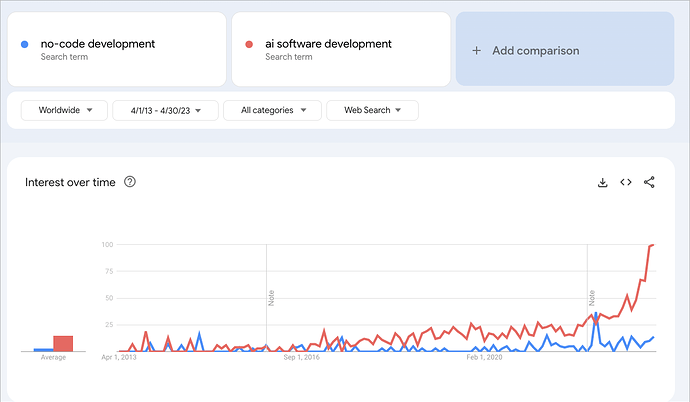The nerve I have, haven’t I? But hear me out.
No-code and low-code builders and AI are both tools that aim to simplify and democratize the software development process. However, they achieve this goal in different ways and can complement each other.
These platforms enable people with little to no programming experience to build software applications through intuitive, visual interfaces and pre-built components. They democratize software development by removing the need for a deep understanding of programming languages. This opens up the field to a wider range of people and allows for rapid prototyping and development.
AI, on the other hand, can automate and enhance various aspects of the software development process. For example, AI can help with code completion, bug detection, and testing. In the context of nocode and low code, AI could potentially help guide users through the development process, suggest optimal workflows or components based on the user’s needs, or even automatically generate parts of the application based on the user’s requirements.
The impact of AI on no-code builders could be significant. On one hand, AI could make these tools even more user-friendly and powerful, further lowering the barriers to software development. On the other hand, advanced enough AI could potentially render some simpler use cases obsolete by automating them entirely.
Open sourcing Wappler could help mitigate the impact of AI in a few ways. Firstly, it would allow a larger community of developers to contribute to and improve these platforms, potentially keeping Wappler relevant and competitive as AI advances. It could also lead to more innovation and diversity in the low code space, as different developers or organizations could adapt the open-source platforms to their specific needs or use cases.
Moreover, open sourcing Wappler could facilitate greater transparency and trust. As AI becomes more integral to software development, concerns about bias, fairness, and transparency in AI systems are likely to become more prominent. By open-sourcing Wappler, they can allow users to see and understand exactly how the software works, which could be a selling point in a world where AI is increasingly used in opaque ways.
Lastly, open source platforms tend to foster a community around them, which can lead to the creation of a vast array of plugins, extensions, and integrations. These could provide ways for Wappler to interact with AI tools or services, further augmenting its capabilities and allowing it to keep pace with AI-driven development tools.
The impact of AI on no-code/low-code platforms is likely to be significant, but open-sourcing Wappler could help mitigate this impact and even present new opportunities.
Of course, Wappler as a company should still be able to pay the bills. So they should ensure the best way to accomplish this.
BTW, Noodl app are already on their way:
Doomsday spoiler
The Great Filter is a concept that originates from the Fermi Paradox, which asks: “If there are a multitude of technologically advanced civilizations in the galaxy, then why haven’t we detected any signs of them?”
The Great Filter theory posits that at some point from pre-life to a Type III civilization (a civilization that can harness the energy of an entire galaxy), there’s a wall or filter that prevents civilizations from progressing further. This could be due to various reasons such as self-destruction (like pushing a catastrophic button, such as nuclear warfare or ecological disaster), a natural disaster, etc.
If the Great Filter is ahead of us, it means that we have yet to face this major challenge that may wipe out our civilization. If it’s behind us, we are among the lucky ones to have already surpassed it, which might explain why we haven’t had contact with other intelligent life – they’re extinct or haven’t reached our level of progress yet.
Will it be AI that filters us out?



